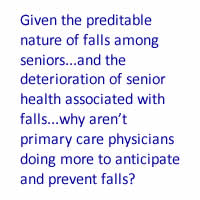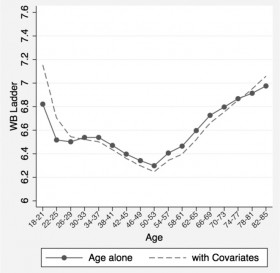September 2nd, 2011 by Paul Auerbach, M.D. in Research
No Comments »

 I am often asked by elder persons whether or not they should take the herpes zoster (“shingles”) vaccine. Up until this point, I have been answering “yes” based on my own experience, but now there is some data to support this recommendation.
I am often asked by elder persons whether or not they should take the herpes zoster (“shingles”) vaccine. Up until this point, I have been answering “yes” based on my own experience, but now there is some data to support this recommendation.
In the article, “Herpes Zoster Vaccine in Older Adults and the Risk of Subsequent Herpes Zoster Disease,” Hung Fu Tseng and his colleagues reported their findings in the Journal of the American Medical Association (JAMA 2011;305[2]:160-161). They evaluated the risk of herpes zoster after persons received the vaccine in a general practice setting.
In a retrospective (looking back at a cohort of patients from medical records) study, the researchers compared Read more »
This post, Article Recommends Herpes Zoster Vaccine For Adults Over 60, was originally published on
Healthine.com by Paul Auerbach, M.D..
March 3rd, 2011 by StevenWilkinsMPH in Opinion, True Stories
No Comments »

We hear about stories like this all time: An elderly person falls and breaks something — a hip, a wrist, or an arm. Soon what once was a healthy, independent senior begins an inexorable downhill slide. Such is the case of my 89-year-old mother who recently fell and broke her wrist.
Turns out that 30 percent of people age 65 and older fall each year. Predictably, seniors with the following risk factors are more prone to falls:
- Using sedatives
- Cognitive impairment
- Problems walking
- Urinary tract infection
- Eye problems
- Balance issues
Similarly, when a person does fall, a cascading series of predictable clinical events occurs. It even has a name: “Post-fall syndrome.” This syndrome is characterized by things like fear of falling again, increased immobility, loss of muscle and control, lack of sleep, nutritional deficits, and so on. Seniors susceptible to falls also have higher rates of hospitalization and institutionalization.

What strikes me about falls among the elderly is that they are seemingly predictable events. And once a fall does occur, the consequences seem pretty predictable as well — enter post-fall syndrome. So if falls and their consequences are so predictable, why aren’t primary care physicians more proactive in terms of:
- Preventing falls?
- Treating post-fall syndrome?
In the case of my mother, her primary care physician and orthopedist were both very diligent at treating her episodic needs (i.e. her pain and broken bones). But little attention, if any, was given to assessing her long-term needs, such as nutrition, inability to do anything with her left hand (she’s left-handed), sensitivity to new medications (she never took drugs because they make her loopy), gait analysis, and depression counseling. Read more »
*This blog post was originally published at Mind The Gap*
January 23rd, 2011 by admin in Opinion, True Stories
No Comments »

This is a guest post by Dr. John Schumann.
**********
In 2011, the first wave of baby boomers will turn 65 years old. Sixty-five still has currency because that’s the age at which non-disabled Americans are eligible to be covered under the Medicare program (now itself having reached middle age).
As our economy continues to recover (hopefully) from the Great Recession, the entrance of millions of Americans to the Medicare rolls over the next decade and a half will be a formidable planning challenge. Look at this chart to see how the baby boomers population has surged:

So is the promise of healthcare reform (the “PPACA“), which will enlarge Medicaid by an additional 16 million Americans — about half of the projected growth in coverage for those currently uninsured.
A couple of recent patient encounters got me thinking about these phenomena, and how we are very much in historically uncharted territory. Never have we had so many living so well for so long. We have an entire generation of people reaching “seniority” who will continue to want the most out of life, without many guideposts on how to achieve it. Read more »
*This blog post was originally published at ACP Internist*
January 5th, 2011 by BobDoherty in Better Health Network, Health Policy
No Comments »

On January 1, Kathleen Casey-Kirschling became the first of the baby-boom generation to qualify for Medicare. She’s hardly alone: The baby-boom generation will cause enrollment in Medicare to soar. According to the Kaiser Family Foundation, Medicare enrollment will increase from 47 million today to 64 million in 2020 to 80 million people by 2030. At the same time, the ratio of workers paying into the program to support each Medicare enrollee will drop from 3.4 (2010) to 2.8 (2020) and then to 2.3 workers per beneficiary in 2030, denying the program the tax revenue needed to sustain it.
What happens then? Well, the President and Congress would have a dismal menu of political and policy choices. They could impose huge tax increases, inflicting great harm on working families and the economy, and they probably couldn’t raise enough money anyway from taxes without other changes in the program.
They could slash benefits for everyone enrolled in Medicare, impose means-testing so only low-income elderly would qualify, increase beneficiaries’ out-of-pocket contributions, limit access to beneficial services (rationing, anyone?), cut how much Medicare pays doctors and hospitals, and/or privatize the program (but if you are over 65 and have chronic health conditions, good luck finding affordable private health insurance). Read more »
*This blog post was originally published at The ACP Advocate Blog by Bob Doherty*
December 26th, 2010 by Elaine Schattner, M.D. in Better Health Network, News, Opinion, Research
No Comments »


This evening, when I finished cleaning up the kitchen after our family dinner, I glanced at the current issue of the Economist. The cover features this headline: the Joy of Growing Old (or why life begins at 46). It’s a light read, as this so-influential magazine goes, but nice to contemplate if you’re, say, 50 years old and wondering about the future.
The article’s thesis is this: Although as people move towards old age they lose things they treasure — vitality, mental sharpness and looks — they also gain what people spend their lives pursuing: Happiness.
Fig. 1 (above): “A snapshot of the age distribution of psychological well-being in the United States,” Stone, et al: PNAS, May 2010 (y-axis: “WB” stands for well-being.)
Young adults are generally cheerful, according to the Economist’s mysterious author or authors. Things go downhill until midlife, and then they pick up again. There’s a long discussion in the article on possible reasons for the U-shaped curve of self-reported well-being. Most plausible among the explanations offered, which might be kind of sad except that in reality (as opposed to ideals) I think it’s generally a good thing, is the “death of ambition, birth of acceptance.” The concept is explained: “Maybe people come to accept their strengths and weaknesses, give up hoping to become chief executive or have a picture shown in the royal Academy…” And this yields contentedness. Read more »
*This blog post was originally published at Medical Lessons*
 I am often asked by elder persons whether or not they should take the herpes zoster (“shingles”) vaccine. Up until this point, I have been answering “yes” based on my own experience, but now there is some data to support this recommendation.
I am often asked by elder persons whether or not they should take the herpes zoster (“shingles”) vaccine. Up until this point, I have been answering “yes” based on my own experience, but now there is some data to support this recommendation.

















